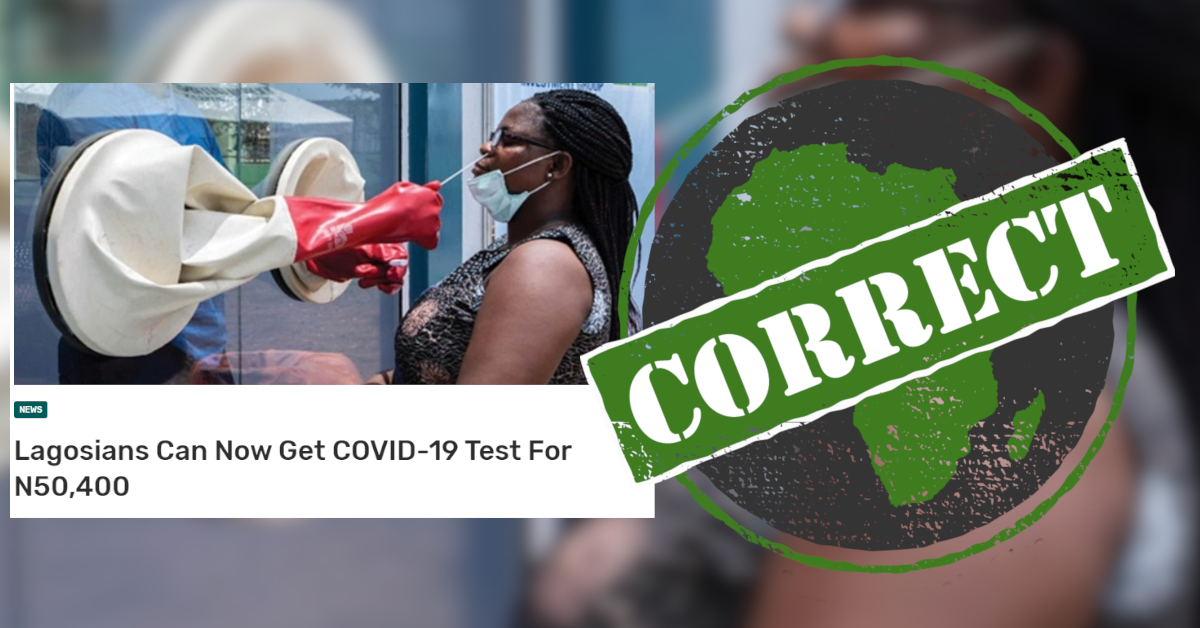People living in Lagos, a Nigerian state that includes its major city, can buy a Covid-19 test at a private laboratory for N50,400 – about US$130. That’s according to several news reports posted on Facebook.
“Lagos state governor through his commissioner for health has announced that Lagos residents who are unable to get themselves tested in government’s own facilities would henceforth pay N50,400 in a private laboratory to conduct Covid-19 test,” reads a 30 June 2020 article on the site Within Nigeria.
As of 7 July, Nigeria had nearly 30,000 confirmed cases of Covid-19, with 654 deaths. But so far, the country has only tested 152,000 of its estimated population of 200 million people.
Facebook’s fact-checking system has flagged the reports as possibly false. Can people unable to access Lagos state’s free service now pay N50,400 for a private test?

Lagos state currently has Nigeria’s highest number of confirmed Covid-19 cases. The state’s government recently partnered with private laboratories to ramp up testing.
Prof Akin Abayomi, Lagos state commissioner for health, said at a 30 June press briefing that this was to ensure more Lagosians were tested. But the tests had to be paid for.
“We recognise the need to expand our testing capacity, especially to the local government areas that are most affected by the community transmission of the virus,” he said.
“Both efforts make it imperative that Covid-19 tests are widely available to members of the public.”
Dr Anthony Ofili, operations manager at Medbury Medical Services, one of the private laboratories approved to conduct the tests, told Africa Check each test would cost N50,400. – Motunrayo Joel
“Lagos state governor through his commissioner for health has announced that Lagos residents who are unable to get themselves tested in government’s own facilities would henceforth pay N50,400 in a private laboratory to conduct Covid-19 test,” reads a 30 June 2020 article on the site Within Nigeria.
As of 7 July, Nigeria had nearly 30,000 confirmed cases of Covid-19, with 654 deaths. But so far, the country has only tested 152,000 of its estimated population of 200 million people.
Facebook’s fact-checking system has flagged the reports as possibly false. Can people unable to access Lagos state’s free service now pay N50,400 for a private test?

Making tests ‘widely available’
Lagos state currently has Nigeria’s highest number of confirmed Covid-19 cases. The state’s government recently partnered with private laboratories to ramp up testing.
Prof Akin Abayomi, Lagos state commissioner for health, said at a 30 June press briefing that this was to ensure more Lagosians were tested. But the tests had to be paid for.
“We recognise the need to expand our testing capacity, especially to the local government areas that are most affected by the community transmission of the virus,” he said.
“Both efforts make it imperative that Covid-19 tests are widely available to members of the public.”
Dr Anthony Ofili, operations manager at Medbury Medical Services, one of the private laboratories approved to conduct the tests, told Africa Check each test would cost N50,400. – Motunrayo Joel
Republish our content for free
For publishers: what to do if your post is rated false
A fact-checker has rated your Facebook or Instagram post as “false”, “altered”, “partly false” or “missing context”. This could have serious consequences. What do you do?
Click on our guide for the steps you should follow.
Publishers guideAfrica Check teams up with Facebook
Africa Check is a partner in Meta's third-party fact-checking programme to help stop the spread of false information on social media.
The content we rate as “false” will be downgraded on Facebook and Instagram. This means fewer people will see it.
You can also help identify false information on Facebook. This guide explains how.





Add new comment